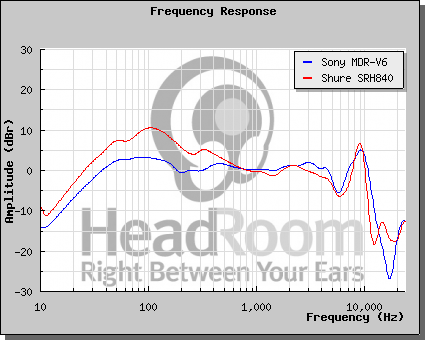The Mighty Headphone Quest Part 5
And on and on we go. I had no idea this would be so time consuming. I also had no idea it would be so interesting to hear how varied headphones can be in side by side comparisons..
So here are few more to gander at. Lets hack away a few more and find a keeper or two as well.
The Koss MV1's has a some dips and is tilted toward vocal inteligeability but we really need a smoother response.

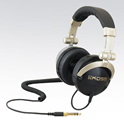


Ohh, and on these Ultrasone HFI-780 we have that double HF dip as well..

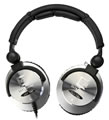
This HF dip pattern is showing up in several headphones. My guess is that some of the headphone designers are actually tailoring the responses a bit to account for the percieved loudness effects as described in the Fletcher Munson Curves to provide a sound that is desirable to listen to.
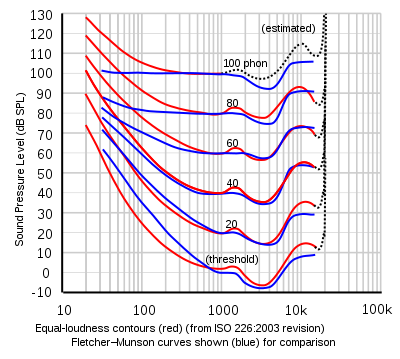
Here as well in the Sony MDR-7509HD cans we see an even more exagerated but similar pattern. I must admit this was a shocker. I really had high hopes for these. Especially with the 50mm drivers, I was hoping to hear something close the Sony CD3000's. The 7509's were both a bit dark and low-end light. Keep in mind I have not really burned in these cans and the burn in could warm the low end up a bit but it is highly that burn-in will fix this huge HF hole. Say bye bye 7509's. Darn!

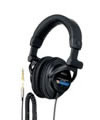
Another EQ pattern is the 'smiley curve EQ' that tends to be pleasing to listen to and often described as Hi-Fi sounding. While this may be a desirable trait for listenability and offer a sound that is not harsh, for our purpose of having a live sound reference point, we want a flat response. The most 'Smiley Curve' sounding headphones I tested so far were the Ultrasone PRO 900's below:

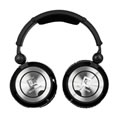
And just to show another reference point, here is the graph of those same headphones on headphone.com
So while I have been hacking away at thinning I also have been finding some few with potential. Right off the bat it became apperent that the Sony 7506's are popular with live engineers for a good reason. Oooh, look at this: With the exception of the HF rolling off a bit early and a slight droop in the sub lows, these are darn good and flat.

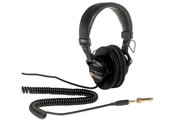
And here is a look at the V6's. Again really flat and I hve heard that the V6 and 7506 have the same 40mm drivers or at least nearly identical and these RTA measurements are within 2 db of each other. Nice cans, not as nice as the CD3000's though. At least we not have a lower end of the spectrum of acceptability.


Now lets take a look at the measurements headphone.com got on the V-6's
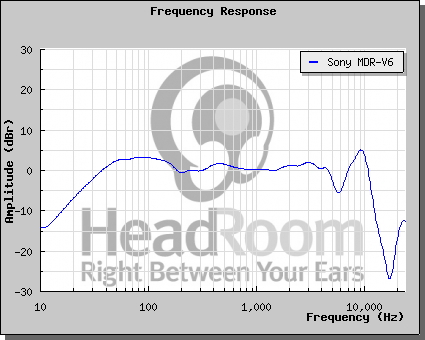
Wow, a wide gentle hole at 250 a small peak at 320, gradual dip into slight peak at 3K, dip at 6.3K, peak near 10K and then rolling off from there into a 20K bounce that my RTA cant read.
One of the big hopefuls I had was the Shure SRH-840's
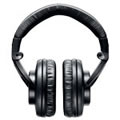 Unfortunately though, the Shure 840 demo ended before I figured out the analyzer snapshot idea and I had already sent the headphones back. But I did get a good amount of time listening to them. So, sorry about no RTA photo but I do have a read out from headphone.com that lines up very well with what I was hearing
Unfortunately though, the Shure 840 demo ended before I figured out the analyzer snapshot idea and I had already sent the headphones back. But I did get a good amount of time listening to them. So, sorry about no RTA photo but I do have a read out from headphone.com that lines up very well with what I was hearing
Notice how well they emulate the response of the Sony V-6's from 500hz on up! Then notice the 6db bass boost. I can see it beeing a well liked response for DJ's and such but for our accurate live sound reference purposes that bass boost is going to be a considerable issue. In fact it looks like they grabbed the best parts of the Sony V6 and 7506 designs and added a removable cable, spare ear muffs and made a nice set of cans that fold up like the Sony's.
Due to the fact that these Audio Technica's AD700's are open ear design, they will not make it as live cans but they sure do have a nice response. A little low end light and looses top a bit early but they actually do meet our +-4 db spec we set for the CD3000's.



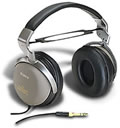
Check out these Koss ESP 950 Electrostatic headphones. Also within our specification though they are also an open ear design.


So, I am going to start putting the headphones that pass the frequency response specification in bold and strikethrough the headphones that for one reason or another will not make it to round 2.
| Model | Disqualifier | Listening notes | Comments | Status |
| AKG 271 MKII | None yet | |||
| Allen & Heath XONE XD-53 | None yet | |||
| Bye bye, ear buds | ||||
| Smiley Curve | ||||
| Bass heavy | ||||
| Beyer DT770M | None yet | |||
| Denon AH-D2000 | None yet | |||
| Equation Audio RP-21 | None yet | Smooth, HM-, UHF+ | Removable straight cable | |
| Bass heavy | ||||
| Grado SR60i | Open ear | |||
| Voice optimized | ||||
| Bye Bye, open ear | ||||
| Speech optimized | ||||
| ouch! | ||||
| Sennheiser HD 25-1 II | On ear | |||
| Sennheiser HD 280 Pro | None yet | HF- | Tonally close | |
| Hi-Fi but dull HF | ||||
| Sony MDR-7506 | Round 2 | ULF-, UHF- | Tonally close | |
| Smiley Curve | ||||
| Sony MDR-90 | On ear | ULF- | Tonally close | |
| Sony MDR-CD3000 | Discontinued | Ref | Ref | |
| Sony MDR-V6 | Round 2 | ULF-, UHF- | Tonally close | |
| Sony MDR-V600 | None yet | ULF-, UHF- | Tonally close, harsh | |
| Bye bye too bassey | ||||
| Low heavy | ||||
| Ultrasone HFI-680 | None yet | Smooth | Tonally Close | |
| Smiley Curve |
Dave Rat
